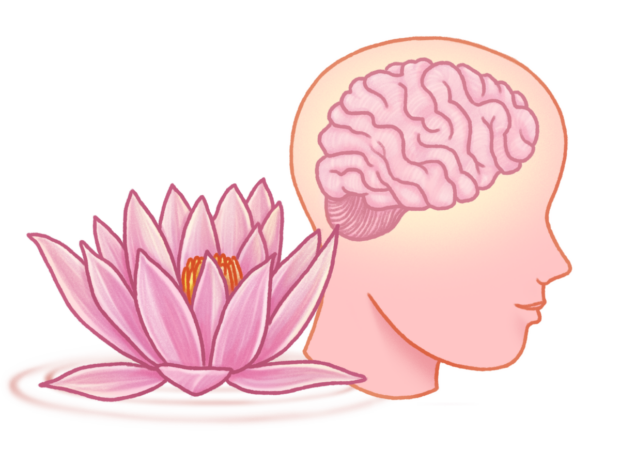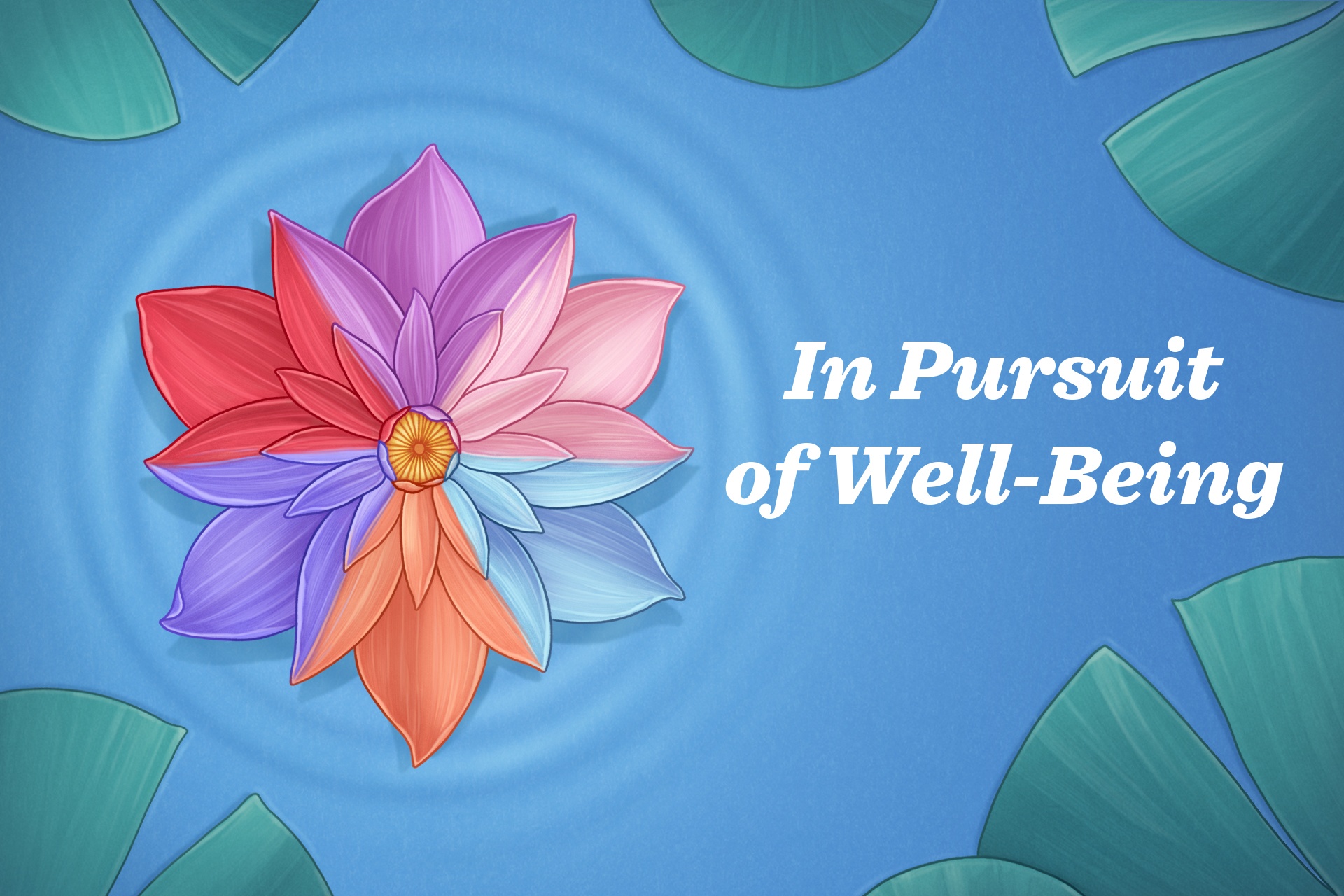In Pursuit of Well-Being
From philosophers to cartoonists, humankind has long attempted to define well-being. Within the university community, the concept is brought to life through varied and vibrant lenses.
June 6, 2022
According to Aristotle, well-being or “being well” is having a sound mind in a sound body. Merriam-Webster tells us it is “the state of being happy, healthy or prosperous.” And, of course, there is beloved Peanuts creator Charles Schulz, who said simply, “Happiness is a Warm Puppy.”
Now if only it were that simple.
From ancient philosophers to modern-day cartoonists, humankind has attempted to achieve and define well-being. Is it synonymous with happiness? Is it just something we know when we feel it?
The Centers for Disease Control and Prevention defines well-being in what is characterized as a “Wellness Wheel,” capturing eight essential components of wellness: social, emotional, spiritual, intellectual, physical, environmental, financial, and occupational. These components are inter-connected and, viewed holistically, provide a definition of well-being that would be hard to argue against.
At the University of La Verne, the pursuit of well-being is baked into our teaching and learning, our research, our outreach, and our relationships with one another. Recently, that commitment has taken on increased visibility through the creation of the Randall Lewis Center for Well-Being and Research, and soon with the launch of the university’s College of Health and Community Well-Being.
The following pages explore the ideas expressed in the Wellness Wheel, as they are experienced across multiple areas of the Leopard community.
Fitness for Health and Life
 Since 2020, our physical health has consumed our collective attention, controlling how we behave in public and in private, and changing how we engage with the world around us. Across the globe, we have learned more about our health and the science that governs it than perhaps at any other time.
Since 2020, our physical health has consumed our collective attention, controlling how we behave in public and in private, and changing how we engage with the world around us. Across the globe, we have learned more about our health and the science that governs it than perhaps at any other time.
Professor of Kinesiology Paul Alvarez, clinical coordinator for the university’s athletic training program, has also thought about what it takes to rebound from a catastrophic health crisis and reboot to wellness.
One year ago, Alvarez found himself hospitalized for a scary episode of ventricular fibrillation, followed by bypass surgery. It was a wake-up call about not only the fragility of health, but about the inequities of America’s healthcare system. His hospital roommate had been admitted for critical and untreated high blood pressure, the result of poor health care and inadequate insurance.
These health disparities that exist in the world have always influenced how he interacts with students and student athletes.
“Many of my students’ parents don’t seek health care because they don’t have insurance, or their cultural background precludes their seeking medical attention when they might need it,” he said. “So in our Fitness for Life classes, we try to emphasize the importance of wellness and getting care when it’s needed. In athletic training, I try hard to focus on the whole person, not the injury. It’s not just a broken ankle, it is the person and how they handle it. It always includes the mental as well as the physical.”
Alvarez has spent his career talking to students and student athletes about physical health and its role in overall well-being.
“I know lots of these concepts won’t sink in right away,” he said. So Alvarez has a method that gets their attention every time; “I show them a picture of myself in college…‘this is me when I was you. And this is me now. Life happens.’”
The message is clear: Take care of your health now. Don’t take it for granted. And take advantage of the many resources the university offers to maintain your physical well-being.
“I teach fitness and health for the long term,” Alvarez said. “My goal is to give them the tools to make the right choices, to maintain a healthy balance throughout their lives.”
Finding Our Emotional Bliss
 “Emotional well-being is more than the absence of a mental illness. It’s that resource within each of us which allows us to reach ever closer to our full potential, and which also enables us to be resilient in the face of adversity.” -Vivek H. Murthy, MD, United States Surgeon General
“Emotional well-being is more than the absence of a mental illness. It’s that resource within each of us which allows us to reach ever closer to our full potential, and which also enables us to be resilient in the face of adversity.” -Vivek H. Murthy, MD, United States Surgeon General
At the University of La Verne’s Center for Neurodiversity, Learning, and Wellness, emotional well-being is explored through a variety of lenses. Center Director Niki Elliott likes to define it as the optimal balance of five key “bliss points”: physical and psychological health; gratifying intimacy, the right balance of friendships, relationships, physical touch, and intimacy; a nourishing environment, whether that be access to the natural world or an aesthetically supportive living or work space; a flourishing vocation, whatever calls us to use our gifts and talents; and transformative spirituality, a connection to community and something greater than oneself.
In his research, psychology professor Jerry Kernes echoes the surgeon general’s emphasis on positive psychology.
“A traditional focus has been on diagnosis and treatment of abnormal psychology,” Kernes said. “While that is important, we also need to focus on what’s right with people—what inspires us, draws us to a higher purpose, to higher potential. One can have a life that might include adversity, might not always have all subjective aspects of happiness, but still have a purpose, a sense of serving others.”
Kernes also emphasizes that a proper measure of well-being is about connection with others and a sense of community.
In Elliott’s work with neurodiverse individuals—those who have learning differences, anxiety, emotional disturbance, trauma, or post-traumatic stress disorder—she affirms a sense of well-being is certainly achievable.
“What is good for them is good for everyone,” she said, but often with an increased need. “We find that grounding, safe relationships are even more critical for these individuals than others. They are already working to compensate for challenges with sensory processing, attention, or memory consolidation, so supportive relationships are more important than ever. Also, the quality of their environment is critical to helping their nervous systems settle, including sound, lighting, color, and feeling.”
Not surprisingly, toxic social stress, including exposure to racism, identity threat, or gender bias can significantly push against the well-being of all of us. Inequity of any kind is a source of emotional trauma.
Is happiness the same as emotional well-being? Not according to Elliott and Kernes.
“Happiness is situational; it’s external,” said Elliott.
“Research tells us that happiness may be an aspect of well-being,” agreed Kernes, “but there is so much more.”
Monday, Monday
 “Heigh-Ho, Heigh-Ho, It’s Off to Work We Go…”
“Heigh-Ho, Heigh-Ho, It’s Off to Work We Go…”
Many of us probably don’t share the enthusiastic harmony from Walt Disney’s Snow White and the Seven Dwarfs about the job we do every day. But according to Robert St. Juliana, director of career development and career success coach for the regional and online campuses, and Amanda Miller, director of the career center, well-being will be elusive if we don’t find some work we can truly be passionate about.
“Career is a part of life,” said Miller. “It’s not just going to work; it’s a place you should feel comfortable in, where you feel whole.”
St. Juliana enjoys working with students to uncover what specific aspects of work would give them this feeling. Most answers include a prioritized list of things like salary, work-life balance, company culture, location, training, company reputation, and benefits.
“It’s normal for this mix of priorities to change over time,” St. Juliana said. “And it’s important for people throughout their careers to check in with themselves to ensure their career remains rewarding and challenging in the right way.”
According to Miller, fulfilling work should be a place that feels like ‘home.’
For many, that fulfilling work could very well be in the home. The word “generativity” is used to define work that is not necessarily wage-earning, but provides the person with a sense of being useful and promoting positivity for another generation. This work could include full-time parenting, fulfilling volunteer activities, mentoring, or engaging in community activism.
Miller, who is also a fitness instructor and holds a black belt in jiu-jitsu, emphasizes the importance of work-life balance to her students. “I share from my own experience that their overall well-being and the work life they are choosing is so important,” she said.
St. Juliana and Miller both coach their students to be open to course-corrections in their career goals. “It’s ok to change your mind,” said St. Juliana. “If you start to have doubts, listen to your own feelings.”
And while you might not sing on the way to work every day, according to these professionals, a chosen career should unquestionably bring you joy.
All You Need is Love… and an Income
 Physical and emotional health are two among the many important factors in our lives that contribute to a sense of peace and satisfaction.
Physical and emotional health are two among the many important factors in our lives that contribute to a sense of peace and satisfaction.
But what if our most basic needs aren’t being met? According to Soomi Lee, associate professor of public administration, whose research includes local public finance and economic resilience, we often manage to avoid the simple subject of money.
“If I ask my students to come up with measurements for a child’s well-being and happiness, they come up with measures of emotional well-being first,” Lee said. “But the basic needs, such as how often they eat, the kinds of foods available to them, whether they have a place to sleep, whether it is warm and has clean running water, are often taken for granted and forgotten.” The priorities of a dependent child are crystal clear.
But are they for adults, for college students? Worrying about money—where your next meal will come from or if you’ll have a roof over your head—can be so all-consuming it can make a sense of well-being almost impossible to achieve.
“Well-being is both subjective and objective,” she said. “Study after study has shown that basic financial liquidity, having a cash cushion, significantly increases one’s well-being.”
Lee sees many university students who don’t yet have that cushion. “These are undergraduates who often work 20 or more hours per week plus take a full academic schedule,” she said. “Some of them become honors students and their achievement is admirable. But they often forgo a good night’s sleep, exercise hours, and healthy eating, all of which are important for one’s well-being. The lack of financial opportunity is a constant drain.”
Much of Lee‘s work is in the area of financial literacy. But what her students already know about finances can be eye-opening.
“A common misperception is that people are poor because they don’t have financial literacy,” she said. “But poor people and poor students—and I was a poor graduate student myself—count every single penny when they spend money. Often the rich don’t know the cost of things. But poor students do know, and when they pick items from a grocery store, they make sure to stay in budget. It’s a myth that poor people are ignorant of finances.”
If financial literacy alone isn’t the key, what is?
“Financial capability—having a bank account, managing a budget, is critical,” Lee said.
For those who struggle with this basic component of life, Lee’s answer is straightforward. “Essentially it is about resource allocation,” she said. “Public policies to provide equal opportunities can move the needle for those struggling with the basics of daily living.”
After all, “the ultimate purpose of economics,” according to former Federal Reserve Chairman Ben Bernanke, “is to understand and promote the enhancement of well-being.”
A Community to Call Home
 What makes for a healthy community? There is no better person to ask than Randall Lewis.
What makes for a healthy community? There is no better person to ask than Randall Lewis.
Lewis is an owner of The Lewis Group of Companies, a family-owned business that has built homes and nurtured healthy communities and environments for more than 60 years. Lewis is also the passionate University of La Verne advocate and donor behind the Randall Lewis Center for Well-Being and Research, opened in 2019, which offers physical, emotional, and mental well-being resources for the campus and its surrounding communities. The new Randall Lewis Center for Entrepreneurship, Innovation, and Social Impact focuses on positive economic impacts for students and partners.
“With my professional background as a home builder, I know that when you buy a house, you think about 1,800 square feet, three bedrooms, and two bathrooms,” he said. “You think about the room sizes, the architecture, the landscaping. But in the late 1990s, as builders, we began to think about more than that. We began to focus more on community building, not simply home building.”
Lewis wanted to build communities that encouraged and contributed to the health and well-being of the residents.
“This was ingrained in our company,” he said. “My parents always said that as a business person you have an obligation to give back to the community where you were successful. Their focus was on health and education, two important components of achieving well-being.”
In Lewis’ communities, residents, of course, have the basics—infrastructure, streets, flood control mechanisms—but they also have safe walking trails, health fairs, partnerships with hospitals, opportunities for volunteerism, and classes on stress reduction, cooking, and nutrition.
“As a buyer or renter, you want the basics but you worry more about other elements,” he said. It is those extra elements that build a healthy community.
As an inveterate walker and a frequent campus presence, Lewis gains some of his passion for the university by simply enjoying what he views as its own healthy community. And he credits the university with helping him find new ideas for his own company.
“The physical elements of the campus itself—the old buildings and trees—make me feel better,” he said. “So much thought has gone into it – colors, fabrics, lighting that won’t flicker or trigger brain disturbances. The different heights of chairs, some with and some without wheels, to accommodate any physical need. This has all been done with the goal of promoting the best outcomes—for promoting well-being—for people on campus.”
A Never-Ending Satisfaction
 One of the University of La Verne’s core values is a commitment to lifelong learning. Across many campuses, and inside dozens of classrooms, an opportunity for lifelong learning is contributing to a sense of well-being for Leopards of all ages.
One of the University of La Verne’s core values is a commitment to lifelong learning. Across many campuses, and inside dozens of classrooms, an opportunity for lifelong learning is contributing to a sense of well-being for Leopards of all ages.
According to AARP research, well-being scores increase with age. Those age 54 and older have higher than average well-being, and after midlife, well-being markedly improves.
Concurrently, research tells us that continuing to learn as we age contributes to a healthier brain. Whether it is learning a second language, taking up a new hobby, or beginning yoga or stretching classes, anything that stimulates our brain and engages our mind and spirit will contribute to life satisfaction. At the university, compatible work is being conducted by Yvette Latunde, co-director for the Center for Educational Equity and Intercultural Research and professor of organizational leadership.
“Well-being can be a set of tools,” said Latunde, tools you can add to as you get older. “Informal learning, not just intellectual learning, can contribute to that set of tools.”
Pursuing a purpose in life, researchers also found, is one of the two activities most closely associated with well-being. Socializing with friends and family, and learning new things are consistently linked to mental well-being. The more brain-healthy activities an adult engages in, the higher their mental well-being.
Professor of Learning Marga Madhuri agrees that well-being can be enhanced as you age. “Well-being comes with getting to know yourself and honoring yourself,” she said. Because people are designed to be learners, they feel the greatest well-being when learning continues for life.
“As an educator you have to be a lifelong learner,” she said. “Well-being and mindfulness are an outgrowth of neuroscience. All learning is emotional.”
Madhuri also believes in self-care. “Breathe, follow your heart, avoid an excess of bad news,” she said. She encourages making time for sleep, movement, nutrition, nature, and stress management for learners of any age.
Observes Latunde, “I think of well-being as being able to set your own goals with the tools and capacity to obtain those goals. Health, wellness, fiscal health, being able to think optimistically. One should strive for joy and inner peace. Whether it’s in your home, with your partner, or in lifelong learning.”
